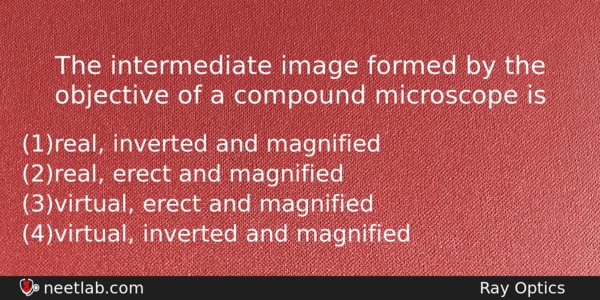| ⇦ | 
| ⇨ |
The intermediate image formed by the objective of a compound microscope is
Options
(a) real, inverted and magnified
(b) real, erect and magnified
(c) virtual, erect and magnified
(d) virtual, inverted and magnified
Correct Answer:
real, inverted and magnified
Explanation:
The intermediate image formed by the objective of a compound microscope is real, inverted and magnified.
Related Questions: - A magnifying glass of focal length 5 cm is used to view an object by a person
- Tangent galvanometer is used to measure
- The most stable particle in Baryon group is
- A balloon with mass m is descending down with an acceleration a
- A particle of masses m is thrown upwards from the surface of the earth, with a velocity u
Topics: Ray Optics
(94)
Subject: Physics
(2479)
Important MCQs Based on Medical Entrance Examinations To Improve Your NEET Score
- A magnifying glass of focal length 5 cm is used to view an object by a person
- Tangent galvanometer is used to measure
- The most stable particle in Baryon group is
- A balloon with mass m is descending down with an acceleration a
- A particle of masses m is thrown upwards from the surface of the earth, with a velocity u
Topics: Ray Optics (94)
Subject: Physics (2479)
Important MCQs Based on Medical Entrance Examinations To Improve Your NEET Score
18000+ students are using NEETLab to improve their score. What about you?
Solve Previous Year MCQs, Mock Tests, Topicwise Practice Tests, Identify Weak Topics, Formula Flash cards and much more is available in NEETLab Android App to improve your NEET score.
Share this page with your friends

Leave a Reply